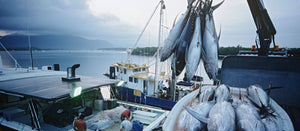Sustaining Our Seas: The Vital Role of Sustainable Tuna Fishing
May 01, 2024
Tuna, often hailed as the "champion of the sea," holds a significant place in global cuisine and economies. However, the methods used to catch tuna can have profound impacts on marine ecosystems. As we navigate the delicate balance between satisfying our appetite for tuna and preserving ocean biodiversity, sustainable fishing practices emerge as the beacon of hope.
Commercial fishing, while feeding the masses, often employs methods that pose a threat to marine life and ecosystems. Overfishing, bycatch of non-target species, and habitat destruction are some of the pressing issues associated with commercial tuna fishing. Enter private fishing charters – a promising alternative that champions sustainability.
2. **Limited Fishing Pressure:** Commercial fleets operate on a large scale, exerting immense pressure on tuna populations. In contrast, private charters cater to smaller groups, limiting the number of fish caught and allowing tuna stocks to replenish naturally.
3. **Environmental Awareness:** Private charters are often led by knowledgeable guides who educate anglers about the importance of conservation. By fostering a deeper understanding of marine ecosystems, these charters instill a sense of responsibility among participants to protect the ocean for future generations.
4. **Local Economic Support:** Choosing private charters supports local economies and small-scale fishermen who rely on sustainable practices to earn a living. By promoting these businesses, we can incentivize the adoption of environmentally friendly fishing methods.
In the quest for sustainable tuna fishing, private fishing charters emerge as key players. By prioritizing responsible practices and environmental stewardship, they offer a glimmer of hope for the preservation of our oceans. As consumers, we hold the power to drive change by supporting initiatives that prioritize sustainability. Together, let's cast our lines towards a future where tuna fishing harmonizes with the health of our planet's seas.
Commercial fishing, while feeding the masses, often employs methods that pose a threat to marine life and ecosystems. Overfishing, bycatch of non-target species, and habitat destruction are some of the pressing issues associated with commercial tuna fishing. Enter private fishing charters – a promising alternative that champions sustainability.
Private fishing charters prioritize responsible fishing practices, ensuring the long-term health of tuna populations and ocean ecosystems. Here's how:
1. **Selective Fishing Methods:** Unlike commercial fleets that often use large nets or longlines, private charters employ selective fishing techniques such as pole-and-line or trolling. These methods target specific tuna species, minimizing bycatch and reducing the impact on other marine life.2. **Limited Fishing Pressure:** Commercial fleets operate on a large scale, exerting immense pressure on tuna populations. In contrast, private charters cater to smaller groups, limiting the number of fish caught and allowing tuna stocks to replenish naturally.
3. **Environmental Awareness:** Private charters are often led by knowledgeable guides who educate anglers about the importance of conservation. By fostering a deeper understanding of marine ecosystems, these charters instill a sense of responsibility among participants to protect the ocean for future generations.
4. **Local Economic Support:** Choosing private charters supports local economies and small-scale fishermen who rely on sustainable practices to earn a living. By promoting these businesses, we can incentivize the adoption of environmentally friendly fishing methods.
In the quest for sustainable tuna fishing, private fishing charters emerge as key players. By prioritizing responsible practices and environmental stewardship, they offer a glimmer of hope for the preservation of our oceans. As consumers, we hold the power to drive change by supporting initiatives that prioritize sustainability. Together, let's cast our lines towards a future where tuna fishing harmonizes with the health of our planet's seas.


